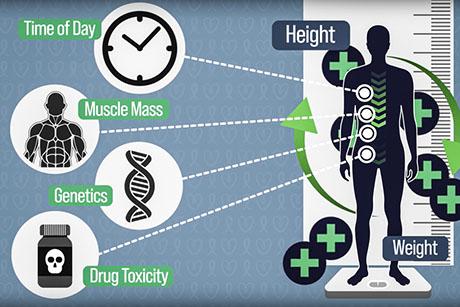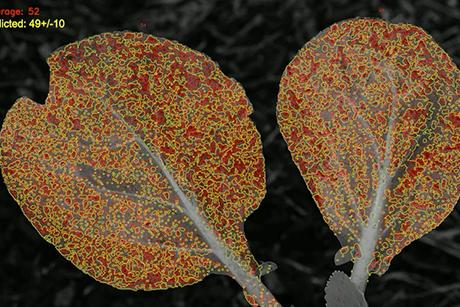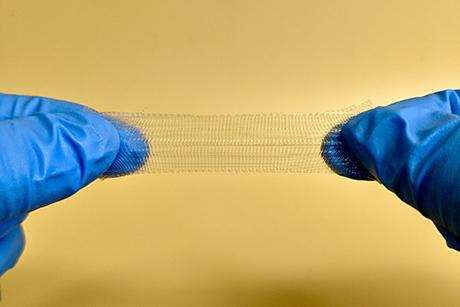Hot flash relief during menopause
Loewen Cavill ’20 hopes to shatter the taboo, and provide menopausal individuals with much-needed relief in the process.
Despite the fact that half of the world’s population will experience menopause, it is often considered a taboo topic. As a result, there are very few evidence-based methods or products that alleviate oneof menopause’s most disruptive symptoms: hot flashes. Loewen Cavill ’20 hopes to shatter the taboo, and provide menopausal individuals with much-needed relief in the process.
“Four out of five women will lose sleep due to hot flashes. Women with severe hot flashes can have them last ten years,” says Cavill.
Cavill is co-founder and CEO of Amira, a startup formerly known as AuraBlue that has developed the first wearable device to predict hot flashes.
Users of Amira wear a bracelet embedded with novel sensing technologies. Based on biological data taken from the bracelet, an algorithm can predict when a hot flash is about to occur. The bracelet communicates this information to a cooling mattress pad underneath the bedsheet. The pad automatically cools down, helping the user regulate their body temperature and preventing the hot flash from starting.
“What’s magical about predicting a hot flash is you can actually mitigate the hot flash experience altogether by cooling women down in advance. This helps keep women asleep through the night,” Cavill adds.
As a student at MIT, Cavill was drawn to the flexibility a degree in mechanical engineering offered. Her experience in the Course 2 capstone class 2.009, Product Engineering Processes, led her down the path of entrepreneurship. In December2019, she and her teammates presented their product, “Uplift,” in front of a sold-out crowd in MIT’s Kresge Auditorium.
Uplift was a portable ramp developed to help airport workers as they load and remove luggage from a plane’s cargo bay. After their presentation, Cavill and her team joined the “delta v” program at the Martin Trust Center for MIT Entrepreneurship. The team had meetings with major airlines like United and Alaskan Airlines.
Then, in March 2020, the pandemic effectively grounded all flights worldwide. Cavill and her team knew it was not the right time to launch a product targeting the airline industry. They made the gut-wrenching decision to drop the company.
It was then that Cavill revisited an idea she had previously hatched with her Uplift teammate Claire Traweek ’20. The pair had participated in MEMSI, the MIT Entrepreneurship and Maker Skills Integrator, a hackathon-style event that takes place in Hong Kong each year.
At MEMSI, Cavill and Traweek developed the first iteration of what would later become Amira. Cavill drew inspiration from her aunt. A longtime sufferer of hot flashes, Cavill’s aunt was desperate for relief and had spent over $10,000 on unregulated products. One such product resulted in a hospital stay.
Following their pitch at MEMSI, Cavill and Traweek were flooded with emails from people asking for more information about the hot flash relief product. The pair realized there was a massive opportunity to regroup the Uplift team and focus on a new product.
“Our pivot was a response to uncertainty at the beginning of Covid, but ultimately it forced us to reconsider our priorities and our product’s effectiveness at making life-changing impacts. Our company post-pivot was definitely far better for it,” says Traweek, Chief Product Officer at Amira.
Cavill’s Amira co-founders, which include Traweek, Emilio Sison ’20, and Felipe Radovitzky ’20, threw themselves into market research. “Their team thrived together in this transition, which reinforces the value of a strong team over a strong idea,” says Paul Cheek, Executive Director of the Martin Trust Center at MIT and one of Amira’s delta-v mentors.
The team’s dedication to developing their product was unparalleled. Sison, who serves as Chief Technology Officer, set an alarm for 4:00am every day to eat a bowl of ghost peppers, inducing a similar physiological response as a menopausal hot flash.
Cavill credits this commitment, and the close bond the team formed during 2.009, with their ability to quickly refocus and develop a new product.
“Building a startup is hard. You see the ugliest sides of people. But after pulling all-nighters during 2.009, several hackathons, and pivoting from the Uplift product, we really got to know how each other works and could thrive as a team,” says Cavill.
User testing and customer feedback has been instrumental in the development of Amira. Cavill and her team have spoken with 350 menopausal individuals and have conducted user testing with thirty-five people. The feedback they have received has been overwhelmingly positive, with one hundred people already on the waitlist for when the product hits the market.
“Before building all of their new sleep technology, Loewen and her team at Amira leaned into the commercialization of their new technology and leveraged market-testing tactics to ensure that a market didn’t just exist, but was activated and would in fact pay for their product,” adds Cheek.
With data from over 300 nights of sleep, Amira has already compiled the world’s largest dataset of hot flashes. As the product goes to market, Cavill sees an opportunity to grow this database, leading to the largest set of health data about women, a demographic that controls 80%of healthcare spend. This could make Amira pioneers in predictive healthcare.
Cavill hopes to bring Amira to market in 2023. The product will be available online, direct to consumer. Longer term, they hope to make the product available through insurance providers and employee benefit programs.
In June 2022, Cavill presented Amira at the first annual MIT Female Founders Pitch in New York. She was awarded the Audience Choice Award.
The positive reaction to the product is perhaps not surprising given the ubiquity of hot flashes. “Women already know they want this problem solved. There is no education needed,” says Cavill.




